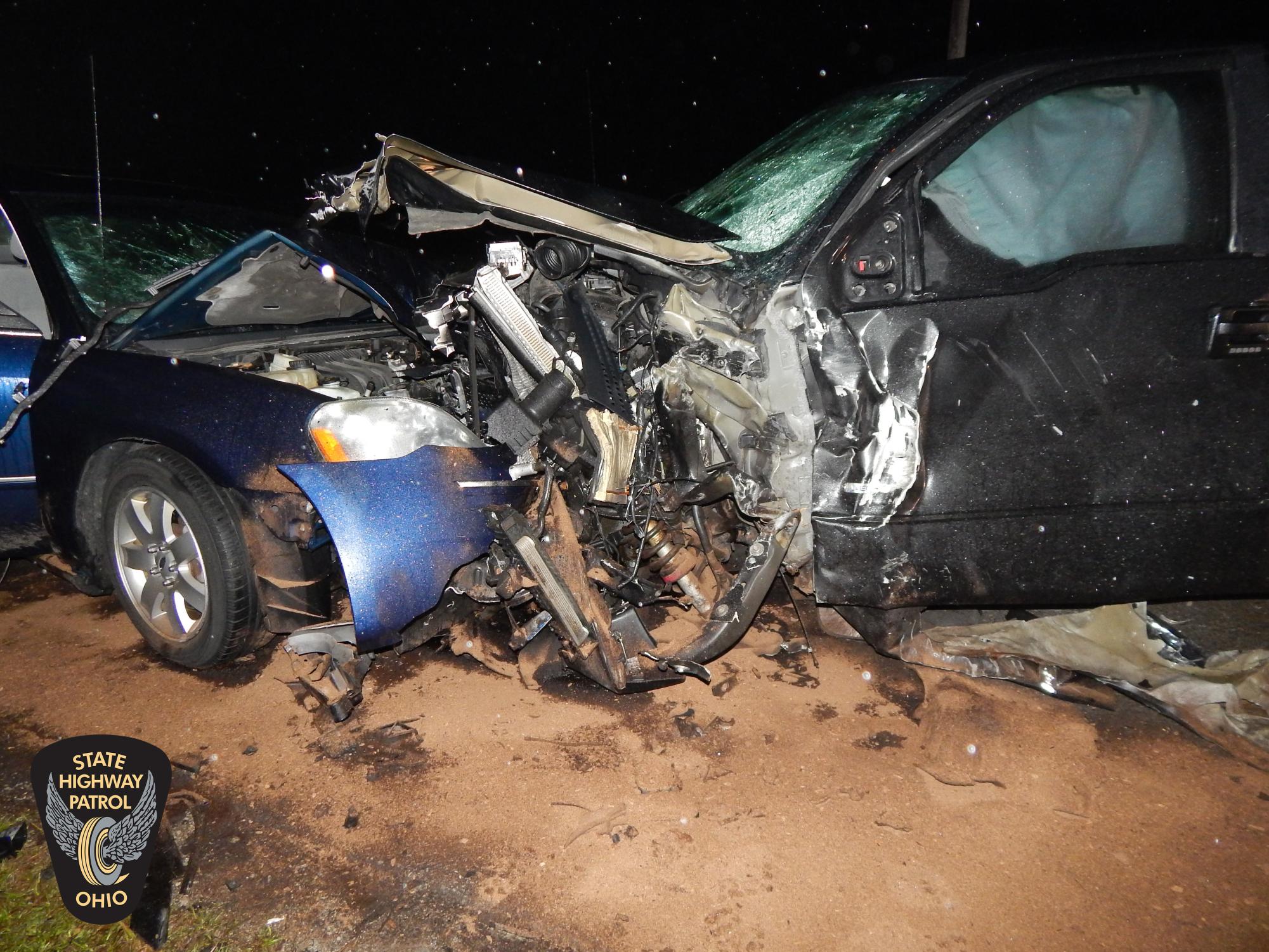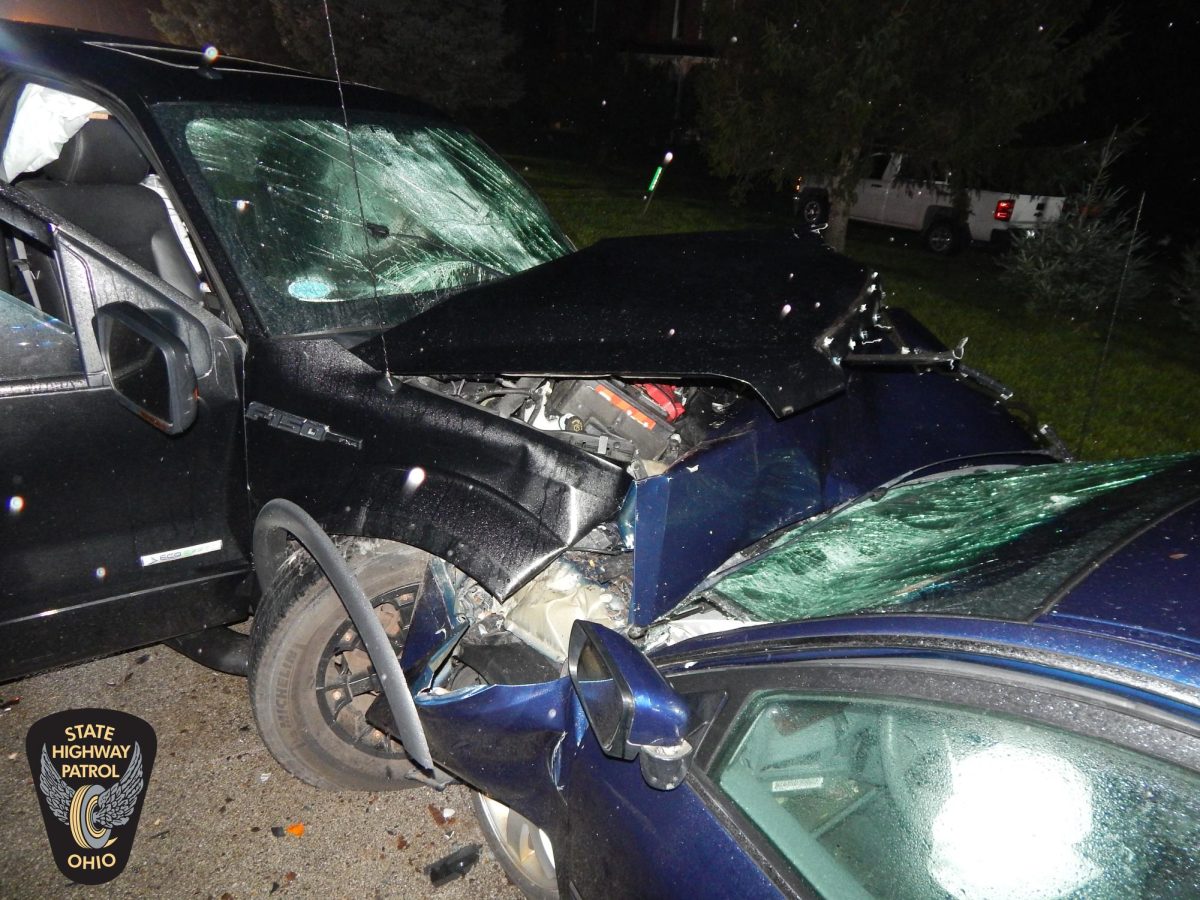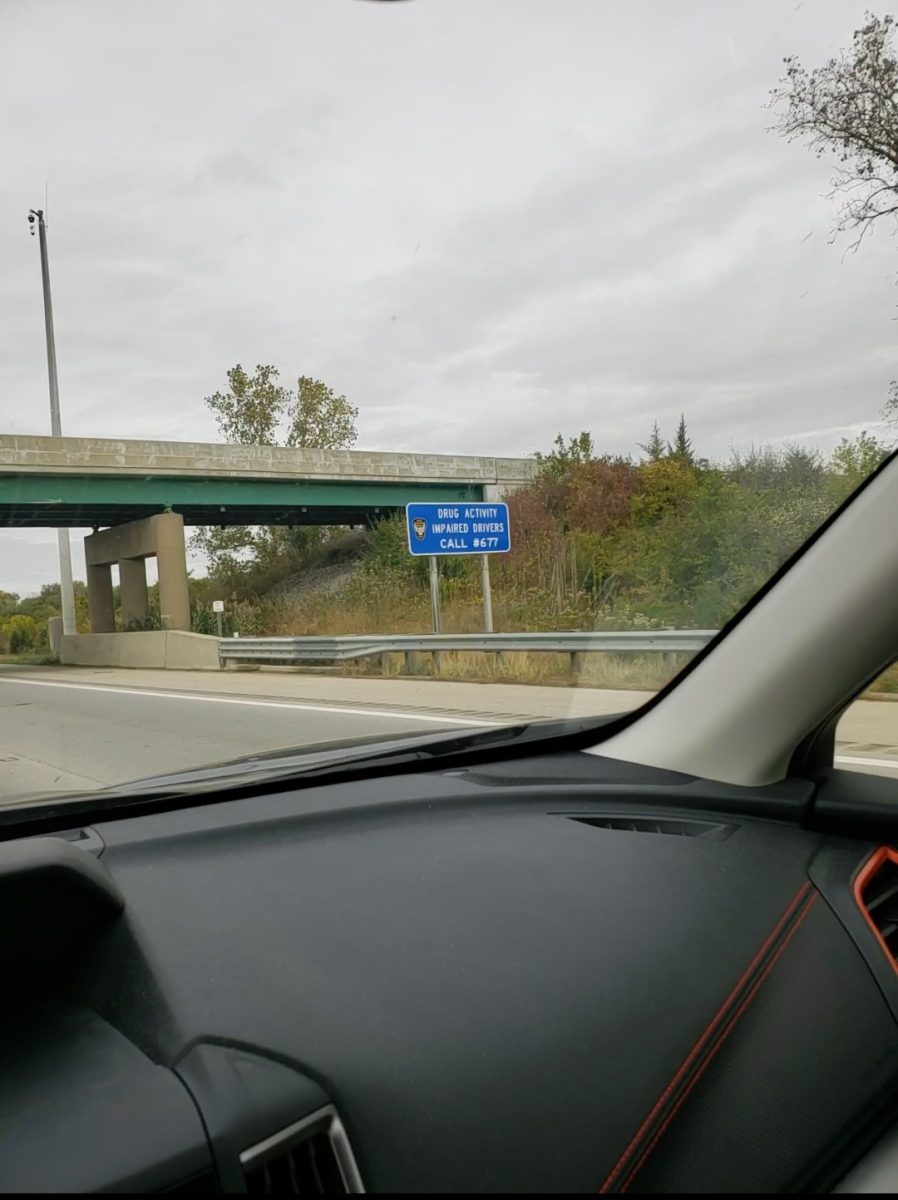Too far gone and one passed on: The prevalent dangers of drunk driving

It was a night out with the guys: four college friends watched a Cleveland Guardians baseball game, went bowling and started traveling back to BG together. It was just another college weekend trip with the guys, just another late night drive back to school.
The Guardians lost – but that didn’t matter. Steve, Vincent and Ryan were close friends with years of baseball memories together, and Cooper was a welcome addition to their group in college. The loss of one game couldn’t shake them – teams win and lose, and that’s how it goes. At 20 years old, they understood what it meant to lose a game.
Headlights seared through the dark. Not three seconds later, a Ford F-150 crashed into the BGSU students.
But in an instant, loss became much more than points on a scoreboard.
In a blinding moment, their weekend trip was over.
Their car was shattered, injuries sustained…and one dead.
With a reported blood alcohol content (BAC) over two times the legal limit, James Baker veered left of center and crashed into three cars, according to Ohio State Highway Patrol official reports.
Baker collided with two cars, the first driven by 18-year-old Michael Jamison, the second by 24-year-old Elizabeth Suhr. Both cars veered off the road. Jamison and his passengers were able to walk away, while Suhr was transported to Wood County Hospital with minor injuries.
Steven Iwanek and his passengers were not so lucky.
After striking the prior two cars, Baker’s Ford F-150 crashed into Iwanek’s car.
David “Ryan” Walker II, son of Belinda and David Walker, lost his life that night in the final collision. The other three in Iwanek’s car were transported to St. Vincent Hospital in Toledo.
Such was the night of Sept. 4, 2022.
For Iwanek, his friends, Ryan’s family and countless others, the pain hasn’t stopped there.
Following the crash, driver Iwanek has experienced “a blend of isolation and injury.” He fractured his left shoulder, broke three ribs, suffered a concussion, cuts, and various other injuries.
While these injuries have healed, Iwanek was left with scars, questions and an experience that will never leave him. He can’t talk about his college experience without this coming up. He won’t be able to tell his future kids about his past without this coming up, stating, quite simply, “it’s hard.”
Ryan was one of Iwanek’s best friends. They knew each other since kindergarten, grew up in the same area, and played both baseball and basketball during grade school together. Once in college, they spent time together almost every weekend.
Vincent Morales, one of the backseat passengers, was Ryan’s best friend. In the first few weeks following the crash, Vince was sedated with serious injuries and missed the initial grief that others went through.
“[The crash] is still something that haunts me every day,” Morales said. “And I don’t think that will ever go away.”
And as for Ryan’s mother, Belinda Walker, the pain has never subsided. When she found out that Ryan had passed, she said she felt that “it [was] just so overwhelming that it leaves you without breath.” Even now, more than one year later, the feeling remains.
“When my child was taken from me…nothing’s changed other than he is not here,” she said. “And my feelings of pain, anger, confusion and sadness still [are] something that I have to deal with every single day…there are many days that I just find myself unable to breathe.”
“And I know you probably don’t understand that because there’s no way I can even convey to you what I am going through…I’m going to take this grief, this sorrow, this pain, and I know that it all looks sad and horrible, and it is, it is…I tell you, I will never, I will never, I will never be the same, and I am going to take this to the grave with me.”
Life for Belinda will never look like it did before.
“My family suffers, but I don’t think the world knows it. They don’t know it,” she stated. “People don’t even know what this does to a family.”
This isn’t an isolated occurrence. Operating a vehicle while impaired (OVI) crashes are prevalent. From 2018 to 2022, there were more than 65,000 OVI-related crashes in Ohio alone, according to the Ohio State Highway Patrol.
They happen every day, at every hour of the day. According to the highway patrol’s online crash dashboard, most OVI crashes within the last year occurred on the weekends between 10 p.m. and 11 p.m., the exact time period when Ryan and his friends were hit.
OVI crashes are prevalent and dangerous.
They can tear lives apart.
And they can happen to anyone.
Thus begins the nightmare of the court system.
Belinda Walker faces it firsthand in the journey to justice for her son Ryan.
The gears of justice grind slowly. James Baker was not taken into custody until Dec. 16, 2022, more than three months after the crash.
He was charged with one count of aggravated vehicular homicide, five counts of aggravated vehicular assault, two counts of operating a vehicle while under the influence, and two counts of improperly handling a firearm in a motor vehicle.
This poll has ended.
Do you believe that stricter penalties for drunk driving would help deter individuals from driving under the influence?
Sorry, there was an error loading this poll.
On May 4, 2023, eight months after the crash, Baker entered a plea of not guilty by reason of insanity. He was medically evaluated and found incompetent to stand trial. Incompetence is the inability of the defendant to understand the proceedings or assist in their own defense.
The trial originally scheduled for June 27 was postponed, and the defending attorney called for a second medical evaluation of Baker.
The next hearing to evaluate his competency to stand trial is on March 8, 2024, 551 days after the crash.
“This injustice is prevailing in the courtrooms and seems to find favor with the defendant,” Belinda stated. “As much as I hate what this man has done to my son, I hate the courts even more.”
“It takes a long time,” Iwanek stated. “It’s frustrating. You just want answers, you just want justice.”
For Belinda, current measures in the law are not enough.
As the trial continues on, Belinda said she finds she has come to a “wall that you couldn’t break through” in enacting change with lawmakers. She started by reaching out to state representatives about increasing penalties for drunk driving offenses, and although they may be actively working on her behalf, she has not heard anything indicating so. She has since contacted the office of Governor DeWine, and is waiting for the chance to talk to him.
“I feel that it just goes to deaf ears, you know, in the legislature where people can make a difference but they don’t. They don’t.”
Belinda said she hopes higher penalties can be set to deter reckless driving behavior as well. According to the law, Baker could receive 2 to 8 years of jail time for aggravated vehicular homicide of the second degree.
After considering the possible consequences of aggravated vehicular homicide and repeat OVI offenses, Belinda suggests evaluations of mental competency should be done on drivers after their second or third OVI. That way, situations of drunk driving can be deterred more often.
Ryan was a third-year BGSU student pursuing a Bachelor of Science in Business Administration with a specialization in Accounting and Finance. He also was a Thompson Working Families Scholar. Ryan accomplished many things during his lifetime, such as working at NASA since he was 16. Ryan is remembered for his intentionality, ambition and devoted love of others.
Today, Ryan Walker’s legacy lives on. He taught Morales what it looks like to have intentional, close-knit friendships and focused ambition. Morales stated: “He kinda molded me into the person I am today…he always had his head on straight.”
He left his mother with memories of his wisdom from a young age and his care for others.
“Beyond being my child, he was a delightful child all of his life,” she said. “Very wise, very wise, since the age of two…we [David and Belinda] would learn from him.”
Belinda reflected that Ryan always understood life for his age. So much so, he corrected his parents for a disagreement they had when he was little and he told them to apologize to each other.
“Everything mattered to him. It just mattered,” Belinda said. “He loved much, he loved hard…There was nothing he was not content with.”
Ryan is remembered for his servant heart. Belinda expressed he always put other people first and never had a problem doing so. After Ryan’s passing, she found a handwritten note in his room with Mark 10:45 written on it: “For even the Son of Man did not come to be served, but to serve, and to give his life [as] a ransom for many.” On finding this note, Belinda was “taken aback” as she felt Ryan truly lived his life that way.
A scholarship was established in his honor to continue his legacy and help high school students and business majors at BGSU go to college. More than just to give out money, Belinda wants to honor that “Ryan can be a helping hand to help students succeed.” This scholarship is a part of the DRW Forever Falcon Foundation which continues to impact students through donations.
Still his story must be told
Belinda Walker recently heard news of Cleveland Cavaliers executive Koby Altman being arrested for an OVI. He made a public statement saying he felt awful about the “distraction” that his arrest caused. She explained “it speaks volume[s] of the lack of awareness of the dangers of OVI driving” as he felt bad about the “distraction” and not the significant danger that he posed to society. Belinda sees it through the lens of the danger he imposed on others, and through the lens of her perpetual pain.
“His actions could have potentially caused a fatal crash but an officer pulled him over. No feeling awful about the 13,300 lives that lie silent in a grave including my precious Ryan.” Belinda said it is important to tell stories like Ryan’s to increase awareness.
Take Olivia Wright, a 22-year-old college student from Ashville, Ohio. She was a passionate student, athlete, and servant of others. But her life ended too soon when she was struck head-on by a repeat drunk driver in September 2020.
Her family has been fighting to get reform in OVI-related legislation. Working with state representatives Mark Johnson and Kevin D. Miller, they introduced House Bill 37, or “Liv’s Law,” to increase drunk driving penalties for repeat offenders.
Repeat drunk drivers may receive harsher punishments as charges pile up. For a second OVI conviction in Ohio, people can be jailed for ten days to six months. Other penalties include up to a seven year license suspension, fine of $1,625, mandatory yellow license plates, ignition interlock devices, and immobilization of one’s vehicle.
“Liv’s Law” aims to increase OVI financial penalties and length of prison term for aggravated vehicular homicide. One initial stipulation of Liv’s Law aimed to amend Section 2903.06 of the Ohio Revised Code (ORC) to define aggravated vehicular homicide in the first degree as including one or more previous violations of OVI law before causing the death of another with a vehicle.
On Oct. 24, 2023, Teresa and Bryan Wright witnessed the next major step in the process of passing Liv’s Law. A sub-bill was proposed to address the issue of OVI offenders. It aims to establish a tier system for penalties of aggravated vehicular homicide based on prior offenses. The sub-bill also aims to require ignition interlock devices for all secondary offenders of alcohol-related OVIs.
For “Liv’s Law” to pass, it still needs to go through the steps of becoming a law.
And this is a process that can take a long time.
It was first introduced in the House of Representatives, approved by the In House Committee, and is currently still in the committee process. After that, it must be passed by the House and then sent to the Senate for approval. After receiving approval from the Senate, the bill would be sent to the Governor to sign it into law or veto it.
Three years after Olivia Wright’s death, the legislation still has not passed through the House.
One year after BGSU’s Ryan Walker has passed, justice has not come for him either.
The Ohio State Highway Patrol implements efforts to curtail OVI crashes, and on average, troopers arrest almost 17,000 people each year for OVI offenses. They set up checkpoints April through October; move-in weekend and the annual tractor pull championship in Bowling Green – both in August – are common checkpoint times. Despite those efforts, thousands of drunk drivers get on the road and cause crashes each year.
Even with OVI checkpoints, breathalyzer tests, auto industry crash tests to measure car safety and criminal punishment for vehicular homicide, drunk driving crashes are still prevalent and fatal.
Ohio State Highway Patrolman Sergeant Ryan Purpura emphasized people have to take personal responsibility for their actions and “make the decision [to not drive intoxicated] for the person on the road next to you.”
Iwanek draws similar conclusions, stating “there’s too many ways to avoid it.” From the context of living in a college town, Steve addressed students who are going to drink: “just don’t take the party outside [of] the party” and understand that there are other people on the road outside of yourself. He emphasized college students are not the only people living in Bowling Green – if you decide to get on the road while impaired, you assume responsibility for the potential to hurt young kids, students, parents and families that might also be on the roads. Not everybody was invited to that party.
There are many other options that individuals can use in getting home safely.
“Substance-related vehicle accidents are so preventable,” Iwanek said. “It needs to stop.”
Students and residents can utilize designated drivers or ride-share services like Uber, Lyft, or Bowling Green’s local Ziggy Zooms, a ride-share service created by students for students.
Calling #677 on a smartphone allows callers to anonymously report potentially impaired drivers to the highway patrol.
Aside from taking precautions when drinking, people can connect with services to spread awareness. Sandy Wiechman of Safe Communities of Wood County offers volunteer opportunities and education sessions upon request for campus organizations wanting to get involved with drunk driving prevention.
You can be arrested for a BAC lower than the legal limit.
Current Ohio law states a drunk driving offense occurs when an individual is above the legal limit of 0.08% BAC – or 0.08% alcohol in the bloodstream.
Although 0.08% is the legal limit, lower BACs can still lead to OVI arrests and charges, as long as law enforcement can prove the driver is impaired.
Sandy Wiechman of Safe Communities of Wood County said that although 0.08% is technically the limit, significant impairment occurs at lower levels with every additional drink. Wiechman emphasized people can experience impaired vision even at a BAC level of 0.04%.
Your donation will support the student journalists of Bowling Green State University. Your contribution will allow us to purchase equipment and cover our annual website hosting costs.



![[From left to right] Eduardo Santos (brother), Belinda Walker (mother), Rebekah Savage (sister), and Ryan Walker](https://bgfalconmedia.com/wp-content/uploads/2023/11/Ryan-w-family.jpg)


Bryan • Dec 6, 2023 at 2:18 pm
Emily this is Brian Wright. I want to thank you for bringing awareness to this issue in the state of Ohio and for your very accurate reporting.
Emily Manuel • Dec 7, 2023 at 12:31 pm
Mr. Wright, thank you for your comments – it is an honor to hear your thoughts on the article. It was a privilege to be able to raise awareness about Olivia, Ryan, and drunk driving. Best wishes to you.
Jenna • Nov 17, 2023 at 4:02 am
Thank you, Emily, for honoring Ryan’s life in this way and for raising awareness about drunk driving, the justice system, and available resources.
Emily Manuel • Dec 7, 2023 at 12:06 pm
Thank you, Jenna, for your thoughtful words. Many don’t realize the severity of drunk driving, yet Ryan and his friends had to face this reality firsthand.
Jenna • Nov 17, 2023 at 4:01 am
Thank you, Emily, for honoring Ryan’s life in this way and for raising awareness about drunk driving, the justice system, and available resources.
Harold Brown • Nov 15, 2023 at 1:30 pm
Excellent job Emily. Great interviews, sources. A reader can tell you dug deep and connected. Keep up the good work.